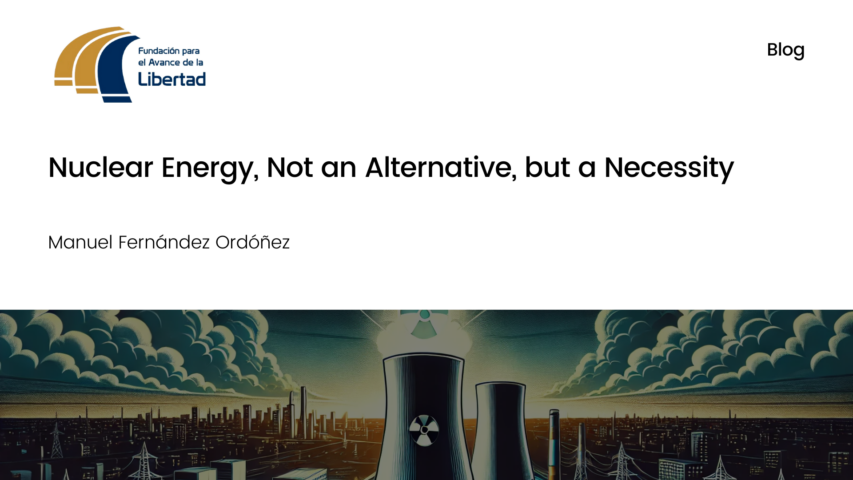Nuclear Energy, Not an Alternative, but a Necessity

Nuclear Energy, Not an Alternative, but a Necessity
Manuel Fernández Ordóñez // 1 July 2022
Humans are currently faced with an energy transition in response to a challenge of unprecedented magnitude. In order to combat global warming, nations have embarked on a difficult undertaking, and based on the results obtained so far, it does not seem that we are on the right track.
It is undeniable that human activities impact on our environment. It is also undeniable that ever since the Industrial Revolution got under way our increasing use of energy has created the greenhouse gases that have affected the climate. In the last decades, starting from the Rio Summit in 1992, to the Kyoto Protocol of 1997 and the Paris Accords of 2015, politicians have been increasingly preoccupied with mitigating climate change. International leaders have signed agreements and reached consensuses on action but have systematically failed to comply with them. They have erred in the past and will continue to do so in the future if their ideological agendas do not give way to a technological realism for an energy transition that may actually be achievable.
The member states of the Organisation for Economic Co-operation and Development and, more specifically, the members states of the EU, purport to be leading the way towards the decarbonisation of their economies by basing their energy systems on solutions that do not rely on burning fossil fuels, as we have been doing for the las 200 years. The EU, through the European Green Deal, has put on the table some objective extremely ambitious goals that aim to be climate neutral in 2050. In summary, those objectives are to
- reduce carbon emissions by 55 per cent in 2030, in relation to 1990 levels.
- reduce the consumption of primary energy by 36 per cent by 2030.
- replace 40 per cent of the energy sources by 2030 with renewable energy.
The sector that generates the most emissions by far is the energy sector. To put it in numerical terms, Europe is responsible for 75 per cent of the world’s overall greenhouse gas emission. Of this total, the energy industry generates 25 per cent, transport generates 15 per cent and the residential and commercial sector together generate 18 per cent of all of emissions.
However, in reality, despite the social preoccupation on mitigating greenhouse gases, emissions have not stopped increasing (except during the financial crisis of 2009 and during the Covid 19 pandemic). In fact, in 2020, fossil fuels produced 84 per cent of the world’s total energy. This is not much of an improvement, given that it was 86 per cent in 2000. And in the last in 20 years, despite the multimillion-dollar investments carried out in energy transition by rich countries, the situation there has not improved either. These investments focused mainly on electricity production. But in 2020, 63 per cent of the world’s electricity was produced by burning coal, gas, or oil. In 2000, it was 64.8 per cent. Fundamentally, nothing has changed. The complete data for 2021 have just been released and they confirm that the consumption of fossil fuels to produce electricity has reach a historical maximum. We had never burned more fossil fuel than we do today.
In short, we are failing. Efforts to reduce greenhouse gases emissions are not working. One of the reasons for this is that we have mistaken the ends for the means. If our goal is not to increase carbon levels, every energy technology that is capable of producing energy without generating emissions would need to be included in any serious analysis. However, this has not been the case with nuclear energy, even though this technology in Europe alone supplies 25 per cent of the total electricity and 50 per cent and 50 per cent of electricity low in emissions. In the USA the numbers are similar and in Spain, the seven nuclear reactors together produce 22 per cent of the electricity consumed.
However, nuclear energy has been (and still is) the focus of irrational and ideological attack by some European governments, who turn their back on the data. Their claim that they are fulfilling their political agendas, based solely on purely wishful thinking, is inappropriate from leaders of developed countries. We saw the latest example of this absurdity a few months ago, in 2021, when the EU, decided, on the advice of its scientific body, to include nuclear energy within the category of green energies. Countries such as Germany, Austria, Luxembourg, and Spain, which initially reacted belligerently to this decision, then came face to face with the reality after the invasion of Ukraine by Russia, which demonstrated the extreme fragility of European energy systems.
Europe is hugely dependent on buying energy from outside its borders. This energy constitutes 66 per cent of its requirements. Moreover, its dependence on external sources has increased by 6 per cent points in only ten years, because Europe’s dependence on gas increased from 67 per cent to 90 per cent during this period. Europe buys from Russia 27 per cent of its oil, 41 per cent of its gas and 49 per cent of the coal that it consumes. This last amount is particularly significant, given that its dependence on Russia for coal was of 22 per cent in 2010. The case of Germany is especially striking: its dependence on Russian gas rose from 36 per cent to 51 per cent in ten years, while its dependence on Russian coal has doubled in the same period. In this context, we can understand the international strategies in international politics that the different members of the EU are taking in the face of the invasion of Ukraine by the Moscow regime.
One of the reasons why Germany has increased its energy dependence on Russia was its incomprehensible resistance to the use of nuclear plants. This political position was taken up when Chancellor Schröder was in power. At that time, he pushed for a timetable to shut down German nuclear plants while taking irreversible steps towards increasing Germany’s reliance on Russian gas. Schröder was the main architect of the Nord Stream gas pipeline and ended up refusing a high position in Gazprom, the Russian company that manages it. The truth is that Germany today would be less dependent on fossil fuels, would emit less greenhouse gas and would have more competitive electricity prices if it had kept its nuclear power plants in operation. However, he decided to close them to continue burning coal and oil while posing himself as a global example of ecological transition. Nothing could be further from the truth.
If we avoid dogmatism and the implementation of ideological agendas, we understand that nuclear energy is essential in an energy transition that aims to be successful:
- It ensures the supply of electricity regardless of conditions. Nuclear power can operate 24 hours a day, 365 days a year. It does not depend on climatic factors such as water, wind or sun and is not subject to the variability of these factors
- It emits minimal greenhouse gases. Considering the entire life cycle of a nuclear power plant (from uranium mining to plant dismantling) the amount of CO2 emitted per unit of energy produced is less than any of the renewable energies, according to the latest UN study. Nuclear power emits 6 grams of CO2 to produce one kWh of electricity, while wind power emits 10 grams, gas 490 grams and coal almost 900 grams.
- It is cheap and lowers the price of electricity. Nuclear energy is offered in wholesale markets according to its variable costs, which are very low. This implies that it helps to reduce the marginal price for the manufacturers, helping to reduce the price of electricity.
- It is not subject to market volatility. The uranium we use as nuclear fuel accounts for approximately 5 per cent of the total operation and maintenance costs of a nuclear power plant. Therefore, even if uranium suffers a sharp price rise, it will hardly have scarcely any impact on the price per kWh. In comparison, in a gas power plant, fuel costs can amount to 60–70 per cent of the plant’s operation, with the price of electricity being very sensitive to the sport prices of gas, as unfortunately it is happening to us today.
- Its production is guaranteed. Each country has stockpiled enough nuclear fuel to be able to produce electricity for several years, even in the unlikely event of a gap in the supply of uranium to the markets. For this reason, nuclear production is considered national, even though the natural resource is imported. By comparison, our gas reserves can last out for only a few weeks.
- It is the safest kind of energy. Based on actual data, nuclear energy is a form of electricity production that causes the fewest fatalities per unit of energy produced, ranking at the level of wind energy and well below hydropower or fossil fuels.
The energy transition, in addition, cannot be restricted solely to the electricity sector. Industrial processes or transport are other areas in which emissions are very high and hardly any effort has been made to deal with them. The electrification of transport and of many industrial processes that currently use fossil fuels are some of the challenges that must be tackled in the medium term. The generation of hydrogen is another area that needs to be explored for its application to transportation and other energy processes. Nuclear energy can play a fundamental role is solving these problems, both from the point of view of the massive production of emission-free electricity and from the point of view of the production of large amounts of heat for use in industrial processes or the generation of green hydrogen.
The new nuclear reactors, both the modular ones that can be mass produced – benefiting from economies of scale) and the fast reactors that can make a sustainable use of natural resources are the future of the nuclear industry in the medium term. The possibility of recycling, in these new reactors, the radioactive waste that we have produced to date in these new reactors is, without a doubt, another incentive for promoting this type of technology.
In short, we are currently facing an unprecedented challenge in the history of humanity: making a radical transformation of the energy systems on which our well-being and quality of life are based. We are, however, failing dismally to meet this challenge. And this is because we are not focusing properly on the problem. We are concentrating on the how instead of the what. Any effort to decarbonise developed economies that seeks to avoid nuclear energy is deliberately, unnecessarily, and fruitlessly places obstacles in the way of our goal. Nuclear energy is an undeniable reality, let’s make it an ally and walk the path to success together.
The original article appeared as a FundaLib briefing. The English version was translated by Julie Favoli.
EPICENTER publications and contributions from our member think tanks are designed to promote the discussion of economic issues and the role of markets in solving economic and social problems. As with all EPICENTER publications, the views expressed here are those of the author and not EPICENTER or its member think tanks (which have no corporate view).



